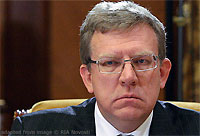New Budget Regulations Do Not Sufficiently Reduce Dependence on Oil And Gas — Kudrin
Interfax - 4.24.12 - JRL 2012-76
MOSCOW. April 24 (Interfax) - Proposals from the Russian Finance Ministry and Economic Development Ministry to restrict budget spending, based on the average oil price for a certain period of time, is a compromise and does not go far enough to resolve the Russian economy's dependence on oil and gas, said former finance minister Alexei Kudrin.

file photoSpeaking at a discussion on macroeconomics, organized by the newspaper Vedomosti, he said budget regulations that would restrict spending based on the average oil price have been under discussion recently. The Finance Ministry suggests using the average price for the last 10 years, while the Economic Development Ministry proposes the average price for the last three years.
The approach to restricting spending has its logic, "at least to build from some actual price," said Kudrin. "But, unfortunately, the actual price for the last 10 years is very arbitrary and, as a rule, an incidental guide in determining this rule," he said.

file photoSuch a compromise could be approved in terms of the transparency of this rule, he said. However, if we move toward this rule, based on the 10-year average oil price, and even more so with the three year average it means "we would have to live now with an oil price of about $60 per barrel."
As such restrictions would be too austere, the Finance Ministry proposes a transition period to 2016. "In 2016 it will be $82 per barrel with the forecast that we currently have for the upcoming years. The Economic Development Ministry says that is also too austere, we are not ready to live at $82 and proposes an average price for three years - and that is around $100-$110," Kudrin said. If the oil price is kept at around $120 per barrel, dependence on oil and gas revenue will increase.
"But as soon as the price falls because in life the actual price will not adhere to the average for the last 10 years or 3 years, we will a more serious problem and it will be even more serious if we are guided by the three-year price," the former minister said.
So Kudrin proposes a more stable indicator - an oil price of $90 per barrel as a constant price, changeable only on inflation in the United States.
"I am ready to agree to a compromise version, but it needs to be adopted immediately and it needs to be closer to the Finance Ministry version," he said.
The budget has already moved to a new level of dependence - $117 million, Kudrin said.
"The government is not making headway as it tries to determine a price, but it is already discussing a level of dependence of $120 and more," he said.
Commenting on the Economic Development Ministry's proposal to restrict spending at the average oil price for the last three years, Deputy Finance Minister Alexei Lavrov said that in essence that option means "the price that is forecast for the upcoming period, that is the volume of spending we will support. For 2016-2017, that is (the average oil price for) 2013, 2014 and 2015. We set a certain forecast level for the oil price and in 2017 the spending threshold will be given," Lavrov said.
This element exists in the 10-year price, but it is more austere. The main problem is to establish budget regulations in the most austere way as possible.
Establishing such regulations does not mean that development of healthcare and education will be contained, the deputy minister said. Along with the restriction of spending, the efficiency of the resources used needs to increase, he said.
The budget regulation parameters need to be written into legislation, Lavrov said. "It should be as hard as possible to change them," he said.
Deputy Economic Development Minister Andrei Klepach said the matter was not about the specific figure at which spending would be cut but about reaching an understanding on what spending will be cut.
"We need to specify the formulation of the budget regulations. This could be $90 per barrel and so on according to U.S. inflation as Alexei Leonidovich said," he said at the discussion.
Any price will mean some kind of budget sequestering, he said. "What will this sequester be for What will be the budget spending priorities, what economic policies will there be and how can we combine development and modernization with supporting budget and macroeconomic stability (... ...), there is not a complete consensus about this," Klepach said.
Keywords:Russia, Economy, Business - Russia, Oil, Gas, Energy - Russian News - Russia
MOSCOW. April 24 (Interfax) - Proposals from the Russian Finance Ministry and Economic Development Ministry to restrict budget spending, based on the average oil price for a certain period of time, is a compromise and does not go far enough to resolve the Russian economy's dependence on oil and gas, said former finance minister Alexei Kudrin.

file photoSpeaking at a discussion on macroeconomics, organized by the newspaper Vedomosti, he said budget regulations that would restrict spending based on the average oil price have been under discussion recently. The Finance Ministry suggests using the average price for the last 10 years, while the Economic Development Ministry proposes the average price for the last three years.
The approach to restricting spending has its logic, "at least to build from some actual price," said Kudrin. "But, unfortunately, the actual price for the last 10 years is very arbitrary and, as a rule, an incidental guide in determining this rule," he said.
Such a compromise could be approved in terms of the transparency of this rule, he said. However, if we move toward this rule, based on the 10-year average oil price, and even more so with the three year average it means "we would have to live now with an oil price of about $60 per barrel."

file photoAs such restrictions would be too austere, the Finance Ministry proposes a transition period to 2016. "In 2016 it will be $82 per barrel with the forecast that we currently have for the upcoming years. The Economic Development Ministry says that is also too austere, we are not ready to live at $82 and proposes an average price for three years - and that is around $100-$110," Kudrin said. If the oil price is kept at around $120 per barrel, dependence on oil and gas revenue will increase.
"But as soon as the price falls because in life the actual price will not adhere to the average for the last 10 years or 3 years, we will a more serious problem and it will be even more serious if we are guided by the three-year price," the former minister said.
So Kudrin proposes a more stable indicator - an oil price of $90 per barrel as a constant price, changeable only on inflation in the United States.
"I am ready to agree to a compromise version, but it needs to be adopted immediately and it needs to be closer to the Finance Ministry version," he said.
The budget has already moved to a new level of dependence - $117 million, Kudrin said.
"The government is not making headway as it tries to determine a price, but it is already discussing a level of dependence of $120 and more," he said.
Commenting on the Economic Development Ministry's proposal to restrict spending at the average oil price for the last three years, Deputy Finance Minister Alexei Lavrov said that in essence that option means "the price that is forecast for the upcoming period, that is the volume of spending we will support. For 2016-2017, that is (the average oil price for) 2013, 2014 and 2015. We set a certain forecast level for the oil price and in 2017 the spending threshold will be given," Lavrov said.
This element exists in the 10-year price, but it is more austere. The main problem is to establish budget regulations in the most austere way as possible.
Establishing such regulations does not mean that development of healthcare and education will be contained, the deputy minister said. Along with the restriction of spending, the efficiency of the resources used needs to increase, he said.
The budget regulation parameters need to be written into legislation, Lavrov said. "It should be as hard as possible to change them," he said.
Deputy Economic Development Minister Andrei Klepach said the matter was not about the specific figure at which spending would be cut but about reaching an understanding on what spending will be cut.
"We need to specify the formulation of the budget regulations. This could be $90 per barrel and so on according to U.S. inflation as Alexei Leonidovich said," he said at the discussion.
Any price will mean some kind of budget sequestering, he said. "What will this sequester be for What will be the budget spending priorities, what economic policies will there be and how can we combine development and modernization with supporting budget and macroeconomic stability (... ...), there is not a complete consensus about this," Klepach said.